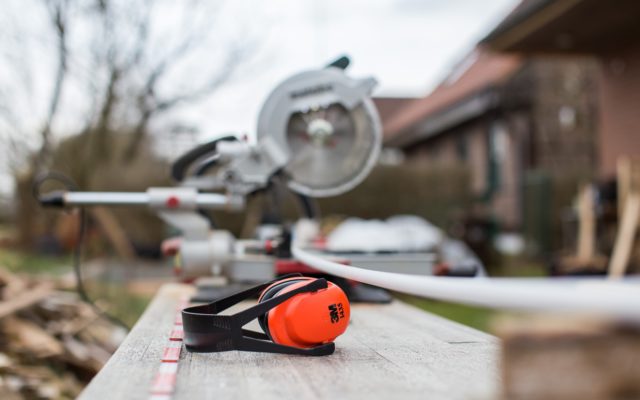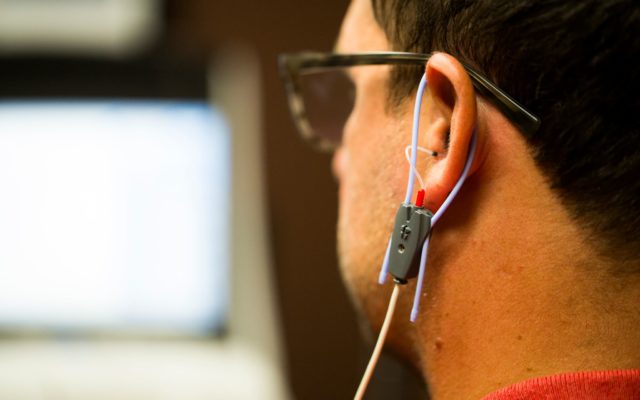
May is Better Hearing & Speech Month
Since approximately 15% of American adults report having some trouble hearing (according to NIH), it is likely that either you or someone you care for is affected by hearing loss. In several cases, the hearing loss is apparent to everyone including the patient. However, in many instances, patients will have a milder loss or perhaps a loss that has had a gradual onset.
What does mild loss of hearing or gradual onset of hearing loss look like?
- Most commonly, such individuals will report having difficulty hearing under adverse listening conditions, such as while at a restaurant or while in a large, reverberant room.
- They may also express frustration because they perceive that others are constantly mumbling or speaking too softly.
- Another sign that there may be a problem is if you or a loved one are experiencing tinnitus—what is commonly described as a ringing, buzzing, hissing, or cricket-like sound in the ears—and is often associated with hearing loss.
- When hearing loss is gradual in nature, patients often aren’t aware that there is a problem because they have become accustomed to the loss, perhaps having even learned to adapt or compensate for it somehow.
- Also, because many individuals with a hearing loss still retain normal hearing across a portion of the frequency spectrum, speech may still sound fairly normal to them, albeit often unclear and indistinct.
If you or a loved one is experiencing any of these symptoms, we would encourage you to have your hearing tested by one of our audiologists. Fortunately, nowadays there are many options for individuals who struggle with hearing loss.
Solutions
Of course, hearing aids are the devices that most individuals are familiar with. However, despite the fact that roughly 81% of users currently report being satisfied with their hearing aids, overall, only about 30% of individuals who report having hearing difficulty actually own a hearing aid (according to Marketrak IX).
Oftentimes individuals are reluctant to try hearing aids due to:
- High cost
- A previous lack of success with hearing aids
- They’ve heard from others that hearing aids don’t work
- They don’t like the way they look
Although these are valid concerns, every person is unique so there is no way of knowing whether a hearing aid is going to help you unless you try one. Common reasons for a bad experience with hearing aids include:
- Limited technology that was available at the time.
- Having been improperly fit with a hearing aid that was not intended for your degree or configuration of hearing loss.
- A lack of verification that the aid was actually providing adequate volume for speech across the frequency spectrum, which can only be ascertained if real ear measurements are performed at the time of the fitting.
Common Concerns
- Hearing aids are cosmetically unappealing. Not true! Luckily, most hearing aids these days are smaller. Options include tiny, behind-the-ear and invisible-in-canal options.
- I can’t afford hearing aids. If cost is a concern, insurance may be able to pick up part or all of the cost. Even if you don’t have coverage, companies such as Care Credit are able to provide financing for individuals who need help. There are even foundations that can provide grants for medical devices (such as hearing aids) to individuals with financial difficulties.
- Hearing aids are a waste of money. We want our patients to understand that our ultimate goal is to help you hear better. We don’t want you to purchase a hearing aid that doesn’t help you! For that reason, if you purchase a hearing aid and the benefit doesn’t justify the cost, you’re able to return it within 60 days.
If your hearing problem is severe enough or if there are other factors at play, a hearing aid may not even be appropriate for you. In such cases, our staff of audiologists and otolaryngologists are able to make sure that you receive the appropriate medical treatment, or that you are seen by a professional who is able to help you with your problem.
Be Proactive!
If you are not experiencing symptoms of hearing loss at this time, please remember to use hearing protection anytime you are exposed to loud noise (e.g., while mowing the lawn, using firearms or power tools, attending concerts, etc.). Your hearing is valuable and most hearing loss is permanent in nature. Nowadays, hearing protection is designed and available for just about any application imaginable. Concert-goers, band or orchestra teachers, factory workers, hunters, motorcycle riders etc., can all benefit from custom hearing protection, which we also provide at our office.
Please contact our office if you’re experiencing symptoms of hearing loss or if you’re interested in learning more about custom hearing protection to prevent hearing loss.
